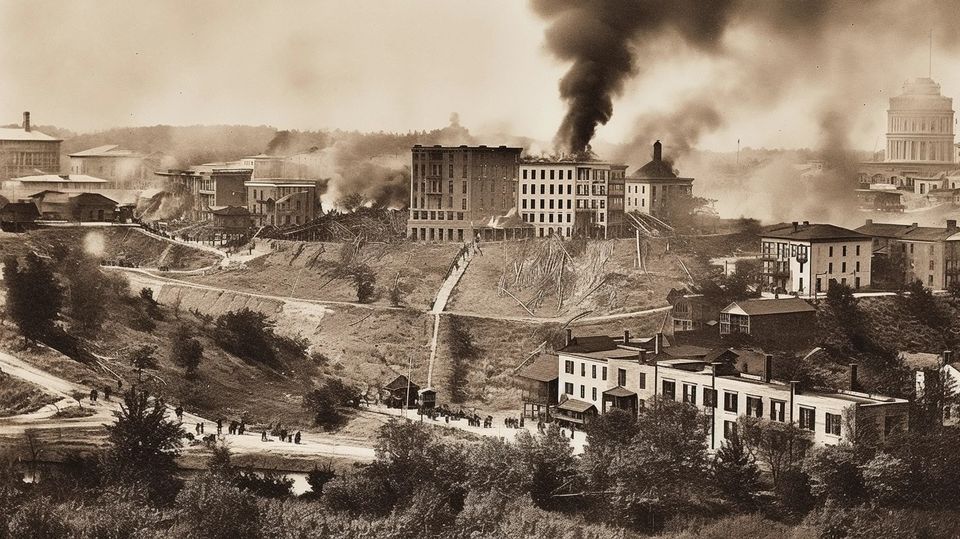Do Wars Settle Constitutional Questions?

So far we've been looking at Southern fire-eaters like Edmund Ruffin and Robert Barnwell Rhett – and their fiery Northern counterparts like Theodore Parker – but moderates had an equally interesting role to play in the buildup to the Civil War. People who know Confederate Vice-President Alexander H. Stephens only for his infamous "cornerstone" speech may be surprised to learn that he opposed secession right up to the very last minute, voting nay at Georgia's secession convention, only to be chosen as a delegate to the provisional Confederate Congress that met in Montgomery, Alabama in February 1861.
Stephens's reverence for the Constitution of 1787 – and the compact theory advanced by Thomas Jefferson, John C. Calhoun and others – so evident both in his speech to the Georgia legislature and his letter to his old friend Abraham Lincoln, never faded. It permeates his prison diary, kept while he was confined at Fort Warren in Boston Harbor after the war, and it shows in his 1866 remarks to the U.S. Congress's reconstruction committee, recounted by Stephens biographer Thomas E. Schott:
He accepted the results of the war as final, but refused to concede that secession had been unconstitutional. Relations between the races in Georgia, he said, were "quite as good" as those anywhere else in the world between employers and employees. He praised the work of General Tillson's Freedmen's Bureau in the state and presented copies of Georgia's recently passed laws as evidence of her good intentions toward the blacks.
On the suffrage question, though, Georgia would be immovable, he said. She would not ratify a constitutional amendment making congressional representation dependent on voting population. the state had done all it would do for restoration. He personally did not object to a restricted black suffrage, but of course, this matter "belongs of constitutional right to the States to regulate exclusively." The states should be immediately restored to the Union, he said; nowhere did the constitutional power exist to require conditions for their reentry to the Union.
Stephens had taken the position he would maintain for the rest of Reconstruction. Typically rendering the Constitution to suit his own thoroughly entrenched preconceptions, he failed to see how tangled his logic was. He believed the war had been fought solely over a constitutional principle. Now, even as he proclaimed that the South had accepted the results of the war – and thus the defeat of its own construction of the fundamental law – he insisted that the problems raised in the wake of the conflict be solved by the South's understanding of the Constitution.
Here Schott seems to be advancing the idea that wars settle constitutional questions – the very notion that Stephens had argued against in his letter to Lincoln. He goes on to criticize Stephens's failure to "see the law as a living organism, growing and changing in response to history." I chuckled at that line, thinking of something Curtis Yarvin wrote in his Mencius Moldbug days:
The US, like Britain, has an unwritten constitution enforced by precedent and custom. The difference is that the US also has a written Constitution, which we pretend is identical to the actual thing. ... It would be a fascinating exercise to actually write down what the Constitution would say if it actually described the structure of the US government today.
(Perhaps some law student should try it. Because this disparity between the written law and the judicially constructed reality certainly does no service to anyone, and it strikes me as much more straightforward to recognize the latter than to return to the former. If nothing else, formalization of the present reality is an excellent starting point for any kind of reform.)
Yarvin/Moldbug dubs himself an absolute monarchist – while not unsympathetic to the Confederates, he thinks they should have been true reactionaries rather than conservatives – and while I'm not sure I fully understand, let alone buy, his policy prescriptions for our era, his enthusiasm for primary sources is invaluable.
Back to Schott.
Congress, however, was dealing with much more than suffrage requirements. It was trying to define the nature of citizenship in the United States. What responsibility did the national government have when a state or group of states denied fundamental rights to a large number of residents? To this Stephens would unhesitatingly reply: "Only such responsibility as the states would allow the federal government to have."
The answer had been grossly inadequate in 1861; it was no better in 1866. Unreconstructed rebels came in many guises. Some, like [Robert] Toombs, kicked and cussed till they died. Others simply could not or would not understand that the war had changed the nation, its Constitution, and the South irrevocably. Stephens was one of these. In his own way he remained as unreconstructed as anyone.
Stephens had written Lincoln: "Force may perpetuate a Union. That depends upon the contingencies of war. But such a Union would not be the Union of the constitution." In 1866, was he merely, and stubbornly, clinging to that point, or illustrating it?
See you next post. If you'd like to get these delivered to your inbox (for free), hit the subscribe button and enter your email address. You may need to check your spam folder for the confirmation email, but I'll never spam you or share your address. You'll just get these posts with the video embedded.
A note on primary sources: You can read the full text of Stephens's speech before the Georgia legislature and his letter to Lincoln in this collection published in 1866.
